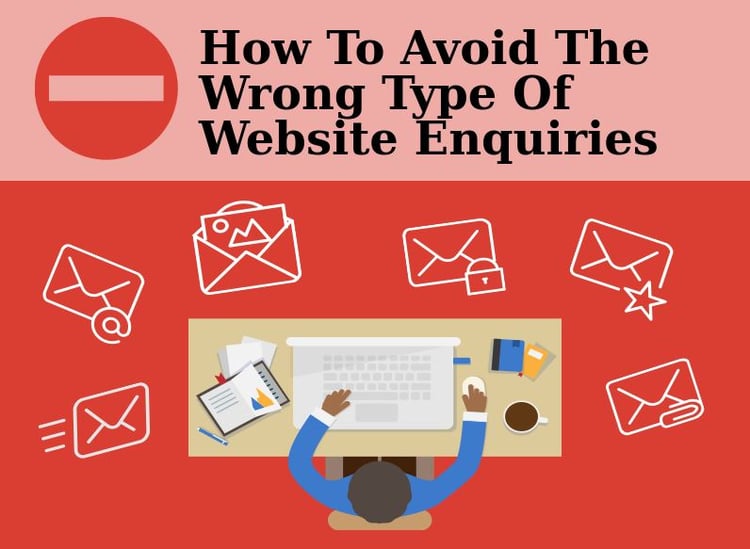How To Avoid The Wrong Type Of Website Enquiries

People are busy-bees. Employees don't like turning customers away, and customers don't like making enquiries only to be told "unfortunately we don't do that..." Unintentionally leading customers on creates a negative atmosphere. For this reason, it's important that your website provides a clear and accurate representation of what you do, otherwise you'll constantly receive the wrong type of website enquiries.
1) Your Website Should Clearly Show What You're Offering
People should be able to tell what your business specialises in, in mere seconds after landing on your homepage. Your branding, your images, your logo, your headlines / subtitles, your CTAs and your layout / navigation menu should give you away. It should be no secret who you are and what you specialise in. In fact, some online marketing experts have argued that if a customer has to click on your "about us" page, then your website is failing to promote who you are!
Take a look at the JDR Group homepage for inspiration:
- The full width image / video immediately tells you that we're a professional company that focuses on helping other businesses
- Our headline "Get Customers Coming To You" immediately tells you that we specialise in business strategies, marketing and lead generation. The four hover-over buttons beneath the headline indicate which areas we specialise in
- Our Call-To-Action button "Get Your FREE Guide" is eye-catching and puts forward the idea that we wish to help
- Our menu at the top of the screen successively guides customers to different areas of the website according to what they are looking for
2) Avoid False Advertising
Claiming to provide a service (or claiming to have knowledge on a given topic) when you don't is a sure-fire way to lose customers. Click-bait titles, misleading prices and false content marketing will shatter the trust between you and your audience. Your marketing should be truthful and honest at all times.
It's also imperative that you regularly update your website with any changes to your business. For example, if you recently stopped supplying a particular product, you must then take this product off your website to avoid any confusion. The same principle applies to your opening hours - if you close early during the winter then you must make a note of this on your website as well as your Google listing.
3) SEO Factors - Create Individual Landing Pages / Calls-To-Action
Modern website structure and design also plays an important role in online marketing. Things to consider include:
- Your webpages must have accurate meta data otherwise Google's algorithm won't show your website in the search results for relevant keyword searches. Please read this article for a full explanation as to why meta data is so important - How To Write A Great Meta Description To Improve Organic Click-Throughs!
- Your webpages should have relevant SEO URL structures that are easy to read and understand. For example, a furniture business should ideally have titles that look like "www.domainname.co.uk/chairs" rather than randomly generated titles such as "www.domainname.co.uk/index-9jsuil0"
- Your website should have a range of Calls-To-Action (CTAs) to help guide your customers through the sales journey. Different CTAs should take customers to different landing pages; the content on that landing page should be specific to what that individual customer is interested in. Personalised landing pages help build a rapport with your customers on an individual-basis, rather than grouping everyone together. Customers that feel valued are far more likely to invest in your business. Take a look below for an example of how this theory works:
- Our Pay-Per-Click page features a CTA that says "Get My FREE Google AdWords Review" > which then takes you a landing page centred around Google AdWords
- Whereas, our SEO page guides you to a landing page solely about SEO analysis
4) Create A FAQs Page
One way to limit the number of website enquiries your business receives is to create a FAQs page. You should promote this page near your contact us section; this way if a customer was looking to ask a question, they can easily find the answer themselves without having to submit an enquiry and wait for a reply.
5) Designing The Layout Of Your Contact Forms
Always remember that people are busy-bees. People simply don't have the time or the energy to fill out long-winded contact us forms, so keep your forms short and sweet. Remember that sometimes in marketing, less is more.
Alternatively, adding a field which prompts the customer to select a certain topic such as "Which areas / services are you interested in?" is a great way to avoid overly-generic or even irrelevant website enquiries.
Adding a short captcha code to your online forms is great way to eliminate excessive spam too.
Final Thoughts
Online enquiry forms are a fast method of communication, therefore it's worth mentioning that your business must reply to any online submissions as soon as possible before the lead goes cold. Ideally you should reply to all enquiries within 12 hours, including weekends and holidays, otherwise your potential customer may go elsewhere.
Feel free to contact the JDR Group today for a full review of your current marketing efforts to help you spot potential ways to improve.


